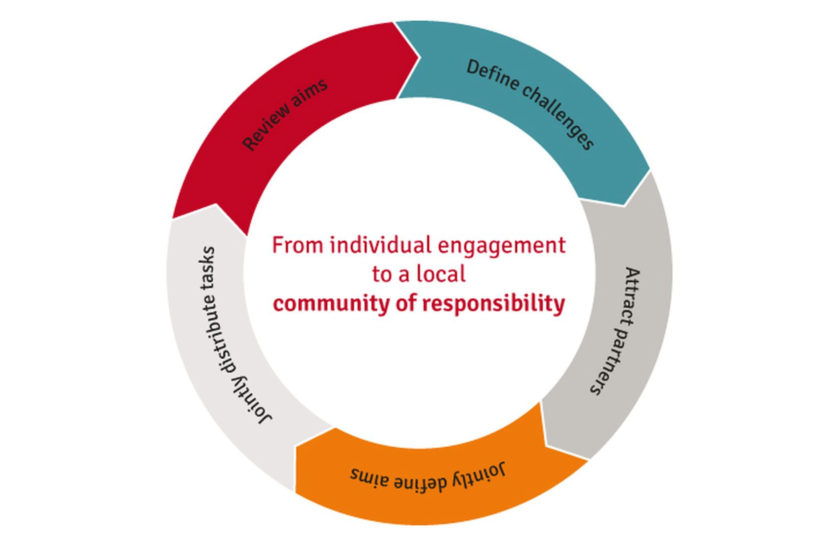The idea: promoting forms of cooperation instead of projects
Engagierte Stadt – local cooperation for civic engagement is not like every other support programme: it stands for nothing less than a paradigm shift in Germany in terms of the promotion of civic involvement. In 2015, five foundations, one company and the German government have invested more than € 3 million into strengthening the development of engagement structures in the country’s cities and municipalities.
The Federal Ministry for Family Affairs, Senior Citizens, Women and Youth, the Bertelsmann Foundation, the BMW Foundation Herbert Quandt, the Generali Future Fund, the Herbert Quandt Foundation, Körber-Stiftung and the Robert Bosch Foundation not only pooled their financing of the programme, but also provided the network for participating ‘Engagierte Städte’ with the opportunity to gain from the sponsors’ skills and experience. This format, alone, represents a novel concept compared to more traditional programmes.
Be this as it may, the way in which the programme is tailored is particularly novel. For the first time, a programme has been developed that is not merely focused on specific projects or forms of organisation, but on ‘Engagierte Städte’ – cities that commit to the programme. Moreover, this programme seeks to strengthen local forms of cooperation undertaken by diverse actors that – when taken together – form a common commitment strategy.
In contrast to conventional model programmes, Engagierte Stadt – local cooperation for civic engagement is not focussed on specific types of institutions or organisational structures, but on the problem-solving competences of the people on the ground: they know best where the real problems lie. During the application period, applications were accepted from civil society-based providers and intermediary organisations that promote civic involvement, including volunteer agencies, civic trusts and senior citizen’s offices from cities and communities with a population of between 10,000 and 100,000 residents. The institutions had to demonstrate that they had a combined effect with other relevant actors on the ground. In 2015, the programme received 272 applications. As part of a two-stage process, the jury selected 50 cities to join the programme.
In addition to financial support, the cities also receive in-depth advice and belong to a network in which they can share successful solutions. Importantly, the initiators’ long-term goal is to establish a growing movement of cities and municipalities in which civic involvement plays a special role.
The programme began its second phase in 2018. Between 2018 and June 2020, the Federal Ministry for Family Affairs, the Bethe Foundation, the Bertelsmann Foundation, the Breuninger Foundation, the Joachim Herz Foundation, the Körber Foundation and the Robert Bosch Foundation will be investing another €2 million in the programme. The 50 cities from the first phase have remained part of the network and can still take up the numerous opportunities that are available for training, to gain skills and to network. They were invited to apply for the second phase by demonstrating how they intended to further develop the work that they had already begun. The jury consisted of representatives from the funding partners, and it selected 43 organisations that will receive up to €30,000 in financing in addition to non-material support.

